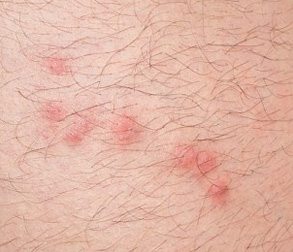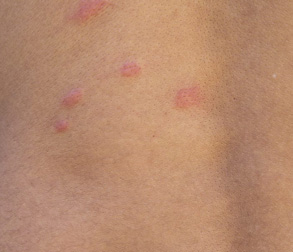Flea bites are enough to make anyone frustrated (including your pets). This actionable guide will teach you how to identify their bites, get rid of the itchiness quickly using various household items (that actually work and are safe to use), and how to protect yourself and your furry friends from being bitten in the future. Let’s get started!
- In a rush? Click here for the quick summary, popular FAQ and YouTube video.
- What are fleas, what are symptoms of their bites, and what do they look like?
- Are they dangerous, and how to treat bites on humans? (13x home remedies)?
- How to treat bites from fleas on your pets (natural methods for dogs and cats)?
- How to prevent bites, how long do they last, and do they differ from other bugs?
What are fleas, and why would they want to bite you?
Fleas are wingless, blood-sucking insects that typically target any warm-blooded animals as their primary source of food. They are a challenge to get rid of due to their tiny size (about 3mm), their relatively high mobility, and the speed of their reproductive cycle. They feed by piercing the skin with their spiny mouthparts, and this bite usually leave an itchy mark that can be both uncomfortable or even painful (depending on sensitivity).
Fleas are opportunistic feeders, and if there are no suitable animals to feed on (that they can find), they do bite humans to get their blood meal. Although they can survive for long periods in the three pre-adult life stages (egg, larva, and pupa), once they are fully grown, they need regular meals; otherwise, they will die. Long story short, if they are hungry and you are around, you will usually get bitten.
PRO TIPS: If you have ever wondered by you keep getting bitten by fleas while someone else does not, it is likely due to your unique scent (released from skin glands) being more attractive to these pests. That is not to say that they wouldn’t bite your “flea immune” friend or family member if they were the only option, it is just that you are the juicer target. For immediate relief, please skip to the treatment section, and if you just want to keep them away, you can click here for the steps you can take to protect yourself.
What are some flea bite symptoms, and what they look like?
The main symptoms of flea bites are itchiness, a raised bump where the flea penetrated the skin (usually surrounded by a red “halo”, see the photos below), and the surrounding area can get a little red and inflamed. If you are sensitive to their saliva, you may also experience slight swelling and some pain. While it is usually easy to find these symptoms on human skin, what should you look out for on your pets?
Things to look out for on cats: Much like with dogs, your goal is not really looking for the bite marks, but rather the symptoms that they cause on their skin (usually itchiness). While cats also often scratch if they have bites from fleas, they are a lot more flexible and often lick the affected area. I recommend that you investigate if you notice an increase in this behavior, and use a fine-toothed comb to aid in the flea discovery process.
Here are a few pictures of fleabites that should help you understand what they look like. I have intentionally chosen images that are not disturbing, as I don’t want to upset my readers. If you want to see what the actual fleas look like, you can check out that article. Although rare, if you or your pets experience any serious allergic reactions to their bites (such as difficulty in breathing), please seek medical help immediately.
Are they dangerous, and what should you avoid doing?
No, for most people, flea bites are not dangerous to your health and are merely annoying due to the itchiness they cause on the skin. I am not suggesting that this is a pleasant experience, but please don’t let it cause unnecessary stress. Unless you are hypersensitive to the allergens in their saliva (which sometimes may cause hives, swelling and breathing difficulties), you don’t usually need help from a medical professional.
Flea bites on pets are usually more of an irritation than anything serious, but this depends on the quantity, the size of the dog or cat (mainly due to potential anemia), how long they have had them, and if they are highly sensitive. My pets have got these pests many times, and provided I treat them quickly, I never have any complications. However, if you notice any lethargy or are battling to get rid of them, take your dog or cat to the vet.
If fleas have attacked you, please avoid the temptation to scratch the affected area, even though I know it can be difficult to resist. Excessive scratching the bites can lead to bacterial infections, the formation of blisters, pustules, and even scarring on your skin. If you have been doing this for some time, and you are in pain or the glands in your neck are up, I recommend that you speak to a doctor to stay on the safe side.
PRO TIPS: In rare cases, their bites can be a vector for plague, tularemia and typhus, but to be completely honest, it is extremely unlikely that you or your pets have them. As a last precaution, if your pet swallows a flea that has tapeworm larvae, it can result in an infection. If you see your dog dragging its bum on the floor (because it is itchy), please take it to the vet and don’t worry, there are plenty of safe treatments for them. If you have any questions about these dangers, please let me know in the comment section.
How to easily treat flea bites on humans? (13x home remedies)
The first step is to remove any lingering bacteria with some water and gentle soap. Next, get rid of the itchiness by using either a well-established natural treatment (such as those listed below), or an over the counter hydrocortisone cream. I recommend first trying one or two of the remedies listed below, as they are inexpensive, safe for humans, and very effective. If, for some reason, they don’t provide relief, then use the cream. If you want me to recommend what I think you should start with (if this list looks overwhelming), click here to jump to the pro tips section.
PRO TIPS: Don’t get overwhelmed with all these options, just grab whatever is available at home and use it as they are all effective. I recommend that you start off by using the ice, vinegar or toothpaste, as they are all super cheap and likely already available in your home. Lastly, please don’t hesitate to take yourself or your kids to a doctor (or at least the local pharmacist) if your symptoms are causing too much pain or discomfort. Although natural remedies do work, they are not a replacement for sound medical advice.
How to safely treat the bites on dogs and cats? (all natural methods)
 It is easier to treat bites on people due to our almost hairless bodies and solutions available to us, but it is no less important to deal with them on our furry friends. Since they lack the self-control to resist scratching, this often results in them breaking open the skin, which in turn may introduce bacteria into the affected area. If left unchecked, this can cause massive discomfort and even a potential danger to the health of your pet.
It is easier to treat bites on people due to our almost hairless bodies and solutions available to us, but it is no less important to deal with them on our furry friends. Since they lack the self-control to resist scratching, this often results in them breaking open the skin, which in turn may introduce bacteria into the affected area. If left unchecked, this can cause massive discomfort and even a potential danger to the health of your pet.
Speaking of dangers, I just want to point out that there is a lot of misinformation on the internet about treatment options for dogs and cats. Remember, just because something is “natural” and may soothe bites, it doesn’t mean that there are no risks (especially for cats). I recommend you stick to the suggestions below to avoid complications, or at least ask me in the comments section about a DIY option you want to try.
The next step is to mix baking soda (1 cup) in half a bucket of water and use your fingers to rub the solution through your dog’s coat. When it comes into contact with the bite marks on his or her skin, it will provide immediate relief and there will be no real temptation to scratch anymore. If you find a highly sensitive area during this process, remember it and dab a little bit of finely ground oatmeal on the skin for it to work its magic.
The next step is to fill the spray bottle with warm water and shampoo and to focus your efforts on areas where there are bites (which will require some prior investigation). Once complete, moisten some baking soda (so that it turns into a paste) and apply it directly to the marks on the skin. In my experience, unless you have a cat that super chilled, you will likely need to be careful of its sharp claws, so please be careful.
PRO TIPS: Since baking soda is completely safe and effective, this is my recommended method for treating bites on dogs and cats. However, this will not keep them away (more on this in the next section), and treatment is only one part of the management of pet fleas. You will still need to find out where they are coming from, and get rid of all stages of their life cycle.
How long do they last, and how to proactively prevent being bitten?
 The good news is that flea bites will usually go away on their own, but if you want to speed up the process due to itchiness, you can use some of the suggested remedies above. What if you want to prevent being bitten in the first place? Here are a few ways you can achieve that goal for yourself, as well as your dogs and cats:
The good news is that flea bites will usually go away on their own, but if you want to speed up the process due to itchiness, you can use some of the suggested remedies above. What if you want to prevent being bitten in the first place? Here are a few ways you can achieve that goal for yourself, as well as your dogs and cats:
Keep them away from kitty cats: Mix 2 drops of lavender oil with two tablespoons of coconut oil and massage into your cat’s fur. You could also put a bit of ACV in a spray bottle with some water if your feline doesn’t mind it (fairly unlikely, so maybe not lol).
Keep them away from humans: Make an all-natural flea repellent spray that you can use directly on your skin. Mix 8.5 oz (250 ml) of witch hazel, 8.5 oz (250 ml) water, one teaspoon of lavender, peppermint, and tea tree oil, and use to spray on your skin, particularly on your lower legs, ankles, and feet. You can also check out my dedicated page on repellents for some more ideas and tips.
PRO TIPS: Once you’ve treated your pets and yourself, and are all experiencing the sweet relief of itch-free skin, you will have to manage your environment. Those little bloodsuckers will rear their heads up to bite you all again if you don’t break their life cycle. Start with areas that are causing you the most frustration (e.g. in your bed, in the yard, or on your carpets), and let me know if you need some help. I have lots of expertise in this area of pest control, and would love to share a bit of advice if you are stuck.
How do bites from fleas differ from bed bugs and mosquitoes?
I know how it feels to find a bite mark on your skin and start to think of the worst, but it is imperative to take a deep breath and figure out what insect caused it. If you skip this step, you can spend time and money trying to get rid of the wrong bug! Speaking of which, here are the major differences between a flea bite and those from a bed bug or mosquito. If you are still unsure, contact me, and I will help you.
Differences to mosquito bites: While it does depend on your sensitivity to mosquito bites, they tend to itch very quickly (within a few minutes of being bitten) and leave a raised mark after 24-48 hours. Mosquitoes can fly around to get to you inside your house, so if you are experiencing bites that are not just limited to lower legs and feet, and this is happening throughout the day, it is likely due to mosquitoes and not fleas.
PRO TIPS: If you are unsure, or if the affected area is not healing, please contact a medical professional as soon as possible. Usually, a little red mark is nothing to worry about, but experiencing negative symptoms like shortness of breath or dizziness, it should not be ignored. That being said, if you apply some of the remedies listed above, you should get some relief, so give a few of them a try!
A quick summary of this guide if you are short on time:
Fleas are wingless, blood-sucking insects that will try to feed on you if there are no other warm-blooded animals (such as pets) available in their immediate environment. Here are some pictures of them on some pets. If you do get munched by a flea or two, there is no need to panic, as the result is usually just a bit of redness, a raised bump (where the flea pierced the skin), and the affected area usually gets very itchy. The symptoms are similar on dogs and cats, so investigate if your furry friend keeps scratching continuously.
Unless there are complications due to an infection (usually caused by excessive scratching of the affected area) or severe allergies (such as flea allergy dermatitis in cats or dogs), fleas are not dangerous and are more of an irritation than anything else. However, that doesn’t mean you should ignore the problem, and the good news is that there are quick and easy home remedies that will alleviate the itchness. I have tested all of them and they work, so just choose whatever option is available in your home and use it.
While people can usually resist the urge to scratch (which is important to prevent it getting infected), it is not as easy for your dogs and cats. Even if this doesn’t cause complications, long term neglect can result in an unhappy pet, which I am sure that you want to avoid (they hate fleas as much as you do, I promise). The good news is that there are a couple DIY methods for treating your pet flea bites, and provided you follow the dosages in this article, they are completely safe. That being said, if you are not winning, please visit your local vet.
Provide you don’t get a reaction or infection from the bites, they will usually go away after a day or two, or at worst, after about 2 weeks. If you want to protect yourself from being bitten in the first place, there are a couple things you can do (click the link to jump to the section). Lastly, if you find a red mark on your skin, it is always best to investigate if it’s fleas, bed bugs, mosquitoes or another bug, as that will dictate your next steps. I have often experienced situations where I presumed it was fleas, but it was something else entirely.
A couple of popular FAQs, and my concluding thoughts:
Can fleas jump to move around? Yes, although they cannot fly, they can jump about 7 inches vertically and approximately 13 inches horizontally. Considering their small size (1/8 to 1/16 of an inch), this is an impressive acrobatic feat.
Can fleas survive on humans? Yes, but only the adult fleas. They can survive for several months on human blood, but females need to feed for at least 12 consecutive hours to produce viable eggs. Without this, their eggs will not hatch.
Why do flea bites itch so much? The flea saliva contains
15 proteins that are classified as allergens for both people and animals, meaning that they will cause itchiness and other potential reactions. The severity is dependent on sensitivity.
Do fleas bite your private area? Although it is technically possible, it is highly unlikely that these pests will find their way there. Even if they are in your bed, they will just bite any part of your body (they won’t specifically seek out your junk lol).
How many times can a flea bite? Fleas are relentless little biters and can munch on you several times before they have finished eating. Depending on the size of the infestation, this could be up to 400 per day in worse case scenarios.
How to treat bites on young kids? To reduce the itchiness, apply one of the options listed here, and keep an eye on the situation. If there are any other symptoms (besides a bit of itchiness, redness, and a tiny bump), please visit a doctor.
Are there different types of fleas? Yes, there are 2500 different species, with 325 in the U.S,. They all feed on blood, 19 are “common”, and they differ in their preferred host (e.g. dogs, cats, etc.). You can learn more in the linked guide.
Can I still be bitten without pets? Yes, even if you don’t have a pet, you can still have fleas in your home and garden. Yes, it is less likely, but do not rule out the possibility of being bitten by them if you don’t have a dog or cat living with you.
I hope this article has helped you with flea bites and the pesky insects that cause them. If you need to start the process of getting rid of them, I have lots of free guides that will help you on this blog. You can also take a look at my flea removal ebook, which guarantees that you will achieve this goal (or your money back). If you have any questions, please leave a comment below, and I will help you. Thanks for reading!
Hello! My name is Natasha, and I have been helping people with their insect problems since 2012. I have published a book, worked with many pest control companies, and helped thousands with various infestations on a one-to-one basis. My goal for this blog is to create evidence-based guides that are easy to understand, provide sufficient depth and can be trusted to be very accurate. Please remember that my guides are for informational purposes only, and that you agree to the terms of use when reading content on this website. If you leave a comment, I typically respond within 48 hours.





Speak Your Mind